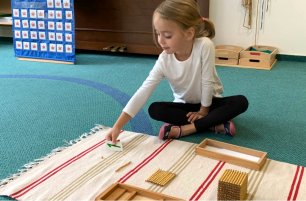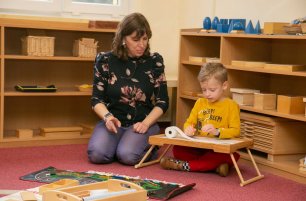Understanding your child's inner sense of order
Have you ever noticed that your child enjoys singing the same song over and over again, or wants you to repeat the same story for what feels like a million times? Dr. Montessori highlighted the importance of sensitive periods in children, which are known as windows of opportunities for children to develop skills, including movement, language and most definitely, order. A child’s need for external order is present as early as childbirth and peaks in their second year, before fading at about the age of 5. This period of development helps a child to develop a connection between themselves and the world, process information and overcome challenges.
How do we identify or recognize a child’s need for order:
Do you sometimes find your child crying or throwing a tantrum but unable to tell you why? Sometimes it’s as simple as us telling a different bedtime story, changing the order of dressing, or going outside to play before meal times, when you have always done the other way round.
Do you sometimes see that your child is frustrated when they can not find a toy that you have “misplaced” after they put it away to a place they remember it? Do you recognize your child’s discomfort when you speak to them in a different language than they’re used to?
.jpg)
HOW DO WE SUPPORT A CHILD’S NEED FOR ORDER?
Observe
First and always, observe. Watch for your child’s behavior in their day-to-day routines. Do they enjoy eating breakfast after it’s ready or do they like being involved in the process of preparing it? Do they put their shirt on first, or their pants? Do they like singing a different song each day, or do they prefer always the same song? Do they like to put their toys away in a specific space (and get upset when they cannot? Each child is different and manifests their sense of order differently. We must first do our part to pinpoint their needs before we can try to help them. To help you, you can make a list of specific questions to look for, like “Is mealtime consistent?” or “Is there a particular way my child likes to be bathed?”. After you had identified the patterns and routine that your child wants to follow each day, even details as small as wanting you to hold their left hand instead of their right hand, you can then start to understand and provide a supportive environment to their needs.
Establish
Recognizing the experiences your child goes through is incredibly important.
Start by creating “ground rules” or a routine that your child would be happy to follow. Be as consistent as you can, within the challenges of your day-to-day life. For some families, a physical chart, timetable, or even a spoken schedule that you remind the child of throughout the day can go a long way. A consistent, unhurried morning is particularly important to kick start a great day for your child. This will help them orient themselves and feel confident in their surroundings, satisfying their inner sense of order.
Support
Once you have identified and established a comfortable, orderly routine for your child, you can follow some simple habits to support it. Interrupt as little as possible or not at all when your child is following their routines and concentrating on their activities, whether they are trying to put a bead through a string over and over again, or finding the jigsaw puzzle piece in different directions, or needing to repeat a certain word or phrase for days. A child’s repetition of behavior, language or step-by-step process is absolutely necessary to happen to protect their development of order and growing relationship with their environment.
Order, as trivial as it seems, can very well be a powerful foundation to serve the child’s well-being and allow them to find their sense of purpose being in a chaotic world.
by Caryn Khoo
Are you curious about how Montessori can help your child thrive? Contact us to schedule and individual tour.





